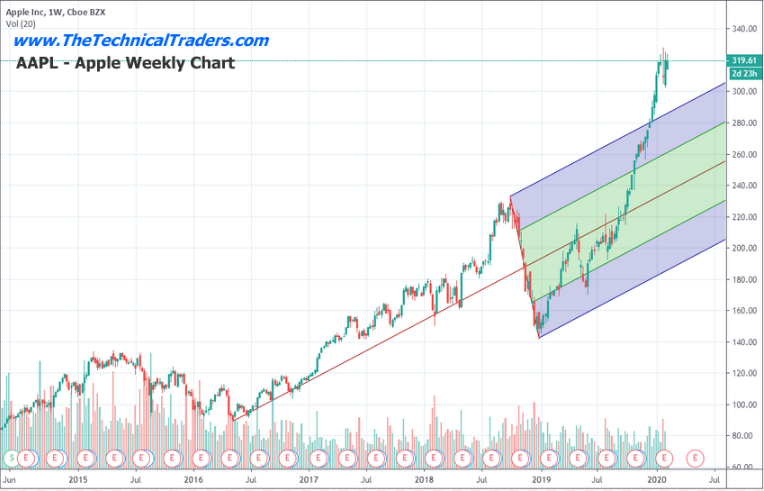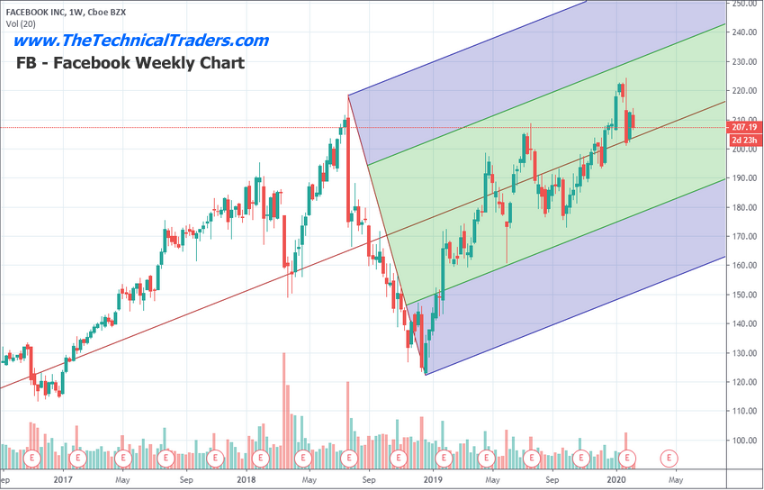Is The Technology Sector Setting Up For A Crash? Part III
Chris Vermeulen | Feb 19, 2020 04:34PM ET
FANG stocks seem uniquely positioned for some extreme rotation over the next 6+ months. The continued capital shift that has taken place over the past 5+ years has driven investment and capital into the technology sector – much like the dot-com rally. The euphoric boom in the late 1990s seems quite similar to today.
The biggest difference this time is that global central banks have pushed an easy-money monetary policy since just after 2000. The policies and rallies that took place after 9/11 were a result of initiatives put in place by George W. Bush and Alan Greenspan. Our research team believes these policies set up a process where foreign markets gorged on cheap U.S. dollars to expand industry and manufacturing throughout the late 1990s and most of the early 2000s. This process sets up a scenario where the U.S. pumped dollars into the global markets after the 9/11 terrorist attacks and foreign markets gobbled this capital up knowing they could expand infrastructure, industry and manufacturing – then sell the products back to the U.S. and other markets for profits. Multiple QE attempts by the U.S. Fed continued to fuel this capital shift.
It wasn't until after 2008-09 when the U.S. Fed entered a period of extreme easy money policy, which encouraged an extensive borrow-spend process throughout most of the foreign world. Remember, as much as the U.S. was attempting to support its markets, the foreign markets were gorging on this easy money, never believing that anything would change, at least in the near future. China/Asia and most of the rest of the world continued to consume USDs while pouring more and more capital into industry, manufacturing and finance/banking.
This process of borrowing from the U.S. while tapping into the expanding U.S. markets fostered a wealth creation process throughout much of Asia/China that, in turn, poured newly created wealth back into the U.S. stock and real estate markets during the past 7 years. It is easy to understand how the trillions pumped into the markets by the U.S. Fed Reserve created opportunity and wealth throughout the globe, which then turned into investments into U.S. assets. Foreign investors wanted a piece of the biggest and most diverse economy on the planet.
This foreign investment propelled a new rally in the technology sector, which aligned with a massive build-out of technology across the world, specifically in China. Remember, in the late 1990s China was just starting to develop large manufacturing and industry. By the mid-2000s, China had already started building huge city-wide industry and manufacturing. But in the late-2000s, China went all-in on tha build-out. This created a massive “beast” in China that depends on this industry to support finance and capital markets. That lead to the recent rise in global and U.S. markets as all of this capital set out in search of the best returns and safest investments.
FANG stocks have taken center stage and the recent rally reminds us of the dot-com rally from the 1990s. Could the Coronavirus break this trend and collapse future expectations within the global markets? Is it possible that we are setting up another dot-com-like bubble that is about to break?
This first chart of Apple (NASDAQ:AAPL) shows just how inflated price has rallied since August 2019. The stock's share price has risen from $220 to almost $320 in the last 6 months – an incredible +49% move. We attribute almost all of this rise to the capital shift that took place in the midst of the U.S./China trade war. Foreign capital needed to find a place to protect itself from currency devaluation and to generate ROI. What better place than the U.S. technology sector?

Facebook has also seen a nice appreciation in value from the lows in late 2018. Since the August 2019 date, though, Facebook (NASDAQ:FB) has seen share prices rise about 25% – from $180 to $225. Although many traders may not recognize the 'double-top' pattern established near the $220 level, we believe this setup may be an early warning that technology could be starting to rollover as capital considers a safer environment and a possible exit from the technology sector.

Google (Alphabet – (NASDAQ:GOOGL) is another high-flier with share prices rising from $1200 to $1500 from August 2019 till now – a +28% price increase. We can clearly see that the stock is well above the historic price channel set up by the rotation in late 2018. We believe resistance near $1525 will act as a price boundary and may prompt a downside price rotation associated with the rotation away from risk within the technology sector. Any downside move, if it happens, could prompt a price decline targeting $1350 or lower.
Concluding Thoughts
Remember, we are warning of a change in how capital operates within the markets. The capital shift that has continued to drive advancing share prices in technology may be nearing an end. It does not mean the capital shift will end, it just indicates that this capital could rotate into other sectors in an attempt to avoid risks and seek out returns. We believe this is a real possibility because we think the coronavirus is disrupting the markets (supply/manufacturing and consumer spending) by such a large degree that we think capital will be forced to identify new targets for returns. In other words, the technology sector may be at high risk for a price reversion event if this black-swan event (coronavirus) continues to disrupt global markets.
Let's face it, a large portion of our technology originates and is manufactured in China. In fact, a large portion of almost everything we consume is made in China. Even the cat food I buy every week is made in China. If this coronavirus continues to force China to shut down large sections of its economy while the virus continues to spread, then the only real outcome for the rest of the world is that China's manufacturing capabilities will be 10-20% of previous levels (if that).
Once supply runs out for most items originating in China, we are going to have to deal with a new reality of “what are the real future expectations going to actually look like,” which is why we are preparing for the fact that the technology sector may be one of the biggest rotating sectors in the near future.
Trading in financial instruments and/or cryptocurrencies involves high risks including the risk of losing some, or all, of your investment amount, and may not be suitable for all investors. Prices of cryptocurrencies are extremely volatile and may be affected by external factors such as financial, regulatory or political events. Trading on margin increases the financial risks.
Before deciding to trade in financial instrument or cryptocurrencies you should be fully informed of the risks and costs associated with trading the financial markets, carefully consider your investment objectives, level of experience, and risk appetite, and seek professional advice where needed.
Fusion Media would like to remind you that the data contained in this website is not necessarily real-time nor accurate. The data and prices on the website are not necessarily provided by any market or exchange, but may be provided by market makers, and so prices may not be accurate and may differ from the actual price at any given market, meaning prices are indicative and not appropriate for trading purposes. Fusion Media and any provider of the data contained in this website will not accept liability for any loss or damage as a result of your trading, or your reliance on the information contained within this website.
It is prohibited to use, store, reproduce, display, modify, transmit or distribute the data contained in this website without the explicit prior written permission of Fusion Media and/or the data provider. All intellectual property rights are reserved by the providers and/or the exchange providing the data contained in this website.
Fusion Media may be compensated by the advertisers that appear on the website, based on your interaction with the advertisements or advertisers.